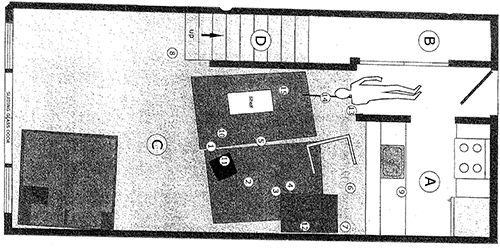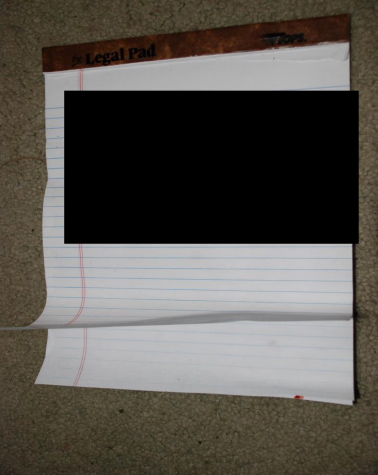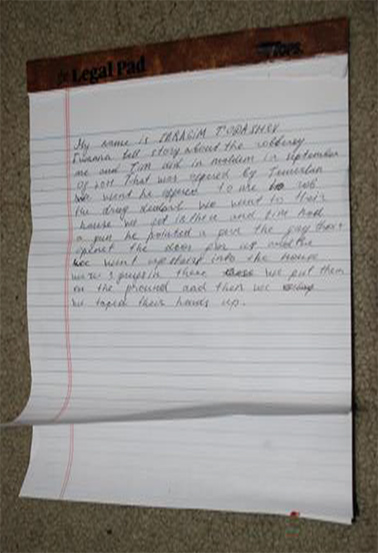Update: "Dead Men Tell No Tales"
Related Episode

A diagram from the FBI Laboratory of the room Ibragim Todashev was killed in, released last week as part of a report from Florida State Attorney Jeff Ashton's office.
Related Episodes
Last week, after months of investigation, Florida State Attorney Jeffrey Ashton’s office released a report on the shooting of Ibragim Todashev. We've been looking forward to this report, hoping it would shed light on some of the mysteries we outlined a few weeks ago in our episode "Dead Men Tell No Tales". It does not disappoint. It's impressively thorough, hundreds of pages long, and it answers some of the questions we raised.
Ibragim, you may remember, was killed by an FBI agent while being questioned at his apartment in Orlando last May. But there was an odd detail to the story: law enforcement officials told reporters that right before the FBI shot him seven times, Ibragim implicated himself in a triple murder. His alleged accomplice for that crime? One of the accused Boston Marathon bombers, long before the Marathon bombing. According to the leaks, Ibragim Todashev was just about to write out a confession when he freaked out, attacked a federal agent, and they had to shoot him to death.
When we did our episode on all this, the FBI and Massachusetts State Police declined to speak with us, so we were left with lots of questions about what happened the night Ibragim Todashev was shot. And we wondered: was Ibragim truly involved with the triple murder? How much evidence did they have linking him to the crime?
The Florida State Attorney’s Office did not interview the FBI agent who pulled the trigger in Ibragim’s apartment, but did question the three other law enforcement officers who were there that night: two Massachusetts state troopers and a member of the Joint Terrorism Task Force. Investigators also reviewed photographs, documents, audio and video recordings, text messages, and lots of other material.
Here are, in our opinion, the most interesting revelations from the State Attorney Officer's investigation:
Going into the final interview, law enforcement had very little evidence connecting Ibragim to the Waltham triple homicide. In the Florida report, a Massachusetts trooper who's identified as the lead investigator in the Waltham triple murder case is asked about his initial interest in Ibragim, but the trooper’s answer is redacted. When asked if Ibragim was a suspect in the Waltham triple murder, though, the trooper answers, "He was a person of interest. Ah, we didn't have anything concrete at that point, that, that tied him into that homicide." When the trooper is asked what further evidence developed to increase their interest in Ibragim, the trooper says, "It was ah, it was more his reluctance to a, a, ah, acknowledge that he was in um, the Boston area in the early, ah, the early week of September. Originally he had put himself outside of ah, outside of Boston area, in August, and [ONE AND A HALF LINES REDACTED] and those are the things that we had wanted to approach him on."
Suspicions of Ibragim being a terrorist, which are what brought law enforcement to Ibragim’s door in the first place in the days after the Boston Marathon bombing, are barely mentioned in the report. There are no allegations at all that Ibragim was involved in terrorism.
This helps answer a question we asked at the end of our broadcast:
 Why didn't they arrest Ibragim that night in his apartment? Did they not have enough evidence for an indictment? The answer to that is no, they didn't. Again, Ibragim was not officially a suspect at the beginning of the interview. The report includes a text message conversation between one of the state troopers and an unidentified person who appears to be involved in the investigation. At one point, after he was informed that Ibragim had confessed to his role in the Waltham triple murder, that person texted the state trooper: "Don’t put him in custody until we get a warrant."
Why didn't they arrest Ibragim that night in his apartment? Did they not have enough evidence for an indictment? The answer to that is no, they didn't. Again, Ibragim was not officially a suspect at the beginning of the interview. The report includes a text message conversation between one of the state troopers and an unidentified person who appears to be involved in the investigation. At one point, after he was informed that Ibragim had confessed to his role in the Waltham triple murder, that person texted the state trooper: "Don’t put him in custody until we get a warrant."
The Florida report also mentions an assistant district attorney back in Massachusetts who, when he learned around 10:30 PM that Ibragim had implicated himself in the triple murder, says he headed to his office that night to draft an indictment.
Another big revelation from the report: There are recordings of the final interview with Ibragim.
In our story, we reported that there were no recordings from that night, because in all the law enforcement leaks and official statements to the media after the shooting, and in all our conversations with people connected to it, no one had ever alleged that there were. The reason for this, it turns out, is that the FBI itself claims it didn’t know there were recordings. The Massachusetts State Police apparently made them on their own, and then didn’t tell the FBI about them in initial interviews after the shooting.
Investigators made one audio and four video recordings of the five-hour interview, captured on three different devices, including a trooper’s cell phone and a video recorder that the trooper had to keep deleting his family videos from during the interview in order to make room on the memory card. "It wasn’t a thought out plan...we were moving on the fly," the trooper says in the report.
There is not a recording of Ibragim attacking the FBI agent or the subsequent shooting. When Ibragim began writing his confession, the trooper who was videotaping stopped recording to check the text messages on his phone.

Still frames from video recordings taken in Ibragim Todashev's apartment, shortly
before he was shot and killed by an FBI agent.
So, since there are recordings: What exactly did Ibragim confess to?
According to an FBI document that’s excerpted in the report, during the interview Ibragim claimed he was not involved in the triple murder, but the interrogators kept confronting him about it. Finally, a little before 10:30, Ibragim said, "Okay, I’m telling you I was involved in it, okay, I, I had no idea REDACTION gonna kill anyone."
Here's more from another, largely redacted, FBI document:

According to the State Attorney Office's report, when Ibragim stated that it was just going to be a robbery, one of the Massachusetts state troopers says he believed they had probable cause to arrest Ibragim. They Mirandized him, but did not arrest him. Instead, they continued to question him for at least another hour. Eventually, one of the officers got Ibragim to agree to write his confession down. At 11:55 PM, one of the state troopers sent a message to the person he was texting with during the interview:
Trooper: "Whos your daddy"
Unidentified Person:"???"
Trooper: "Getting confession as we speak"
Unidentified Person:"Shut the hell up…thought that’s what u were saying. Who doin interview? Any other suspects?"
Trooper: "Me FBI guy And REDACTED. He [Ibragim]. Is now writing the statement. Gonna be a long night. Still in his apt in Orlando. Admitted his role"
When that last text was sent, at 11:59 PM, Ibragim was sitting across from the FBI agent, writing his confession on this notepad:

The photo of the notepad in the report is redacted. But our colleagues at Boston Magazine got a hold of what we believe is an unredacted copy of what Ibragim wrote:

As you can see, the photo is blurry and sometimes illegible (see larger version here). But here’s our best interpretation of what Ibragim wrote:
My name is IBRAGIM TODASHEV
I wanna tell the story about the robbery
me and Tam did in Waltham in September
of 2011. That was [?] by Tamerlan.
[?] [?] he supposed to use to rob
the drug dealers. We went to their
house we got in there and Tam had
a gun he pointed it [?] the guy that
opened the door for us [?]
we went upstairs into the house
[?] 3 guys in there [?] we put them
on the ground and then we [?]
[?] taped their hands up.
After he got to that last line, Ibragim knocked over a table, went after the Massachusetts state trooper with a pole, and was shot seven times and killed by the agent.
But that last line of the written confession caught our eye: Could Ibragim have made a false confession?
Ibragim wrote something to effect of: "we put them on the ground and then we...taped their hands up." The Florida state attorney's report points to this line specifically as demonstrating "the gravity of [Ibragim's] involvement with the crimes being investigated."
But Susan Zalkind, who reported our radio story, spoke last week to the person who first discovered the bodies the three Waltham murder victims, and heard a contradictory account. Susan wrote about it for Boston Magazine:
...when Hiba Eltilib discovered the bodies of her boyfriend Brendan Mess, 25, Erik Weissman, 31, and Raphael Teken, 37, their hands were not bound or taped, she said Wednesday in a phone call from Sudan. Eltilib said that she found the bodies in three different rooms, all belly-down, in neat pools of blood, heads turned to the side.
"None of their hands were tied as I recall," she said.
In an interview Wednesday, Aria Weissman, Erik’s sister, said she’d never heard mention of any of the victims having their hands taped, either. "That was the first time hearing anything about it being him tied up, that’s really bizarre," she said.
And while the note’s claim that "we put them on the ground" sounds as if the victims were ordered down at gunpoint, at least two of the victims showed signs of a fight, according to friends who saw the bodies. Weissman had a bloody lip, and Mess had puncture marks on his temple and the top of his head, another mark by his ear, bruises on his face and scratches on his arms.
The confession mentions a gun, but it doesn’t mention the murder weapon. When Eltilib discovered the bodies on September 12, 2011, the victims' throats had been slit with enough force to nearly decapitate them. The note suggests the motive for the crime was a "robbery," even though eight and a half pounds of marijuana and $5,000 in cash was left in the apartment—and all three of the victims knew Tamerlan. Mess was a close friend.
...Of course, by all accounts, the confession was incomplete. And because of the difficulty in deciphering the document, it’s impossible to say for sure that the note is inconsistent with reports of the crime scene. "Put them on the ground," for example, might have been Todashev’s way of describing a physical fight. The note ends abruptly; there was almost certainly more to the story, but Todashev never finished it.
What should we make of this? If it's true that the victims' hands weren’t taped or bound, why would Ibragim write that he'd taped them? If he did actually take part in the crime, it seems like a noteworthy detail to get wrong.
We called Jim Trainum, to get his take on it. Trainum is a former D.C. police detective who’s an expert on false confessions. (We did a story about Trainum and false confessions last fall.) Trainum does not have inside knowledge of Ibragim's case. But he said that in general, in a reliable confession, when someone gives incorrect details it's usually because they're minimizing their role in the crime, not increasing it.
"For example," he said, "a guy who kidnapped and murdered a child will admit to those but not to the sexual assault. However, if it were the opposite — if you had no sexual assault and the person admits sexual assault — then what’s going on there? Why increase their culpability?"
Trainum doesn't have enough information on this particular case to determine if Ibragim's confession was valid. But he said adding a detail like that can be a sign of a false confession. It's odd that Ibragim would say he'd helped tape the murder victims' hands if that didn't actually happen.
Richard Wallsh, the executive director of Florida State Attorney Jeff Ashton’s office, told us the chief investigator in charge of looking into Ibragim’s shooting did consider the possibility that Ibragim had given a false confession. But Wallsh said that wasn't the focus of their investigation, and the fact that the Massachusetts state troopers felt they had probable cause to arrest Ibragim led the investigator to conclude that the confession was legitimate.
Members of the State Attorney's Office were also able to watch much of Ibragim's interview on the videos recorded by the state trooper. According to the office’s report:
At the conclusion of the review, everyone in attendance agreed the manner in which the interviewing officers communicated with Mr. Todashev was not coercive. During this review, we collectively identified how well Mr. Todashev appeared to be walking as he moved about the room….The group did not observe any violation of his legal rights.
It's important to note, though, that "coercive" means something different in legal terms than it does in practice. "Attorneys are looking at coercive tactics for whether or not they make the confession admissible in court," Trainum said. "They’re usually not judging it on whether problematic interrogation tactics were used that could’ve elicited a false confession."
Clearly the FBI agent and Massachusetts state troopers interviewing Ibragim were satisfied with his confession at the time, because they were getting ready to use it as probable cause to arrest him. And the FBI and Massachusetts investigators are still saying almost nothing about Ibragim's death or the Waltham triple murder case. The FBI released a short statement saying they will keep trying to improve agent safety and training. Meanwhile, the Waltham triple murder case remains open.
"Identifying all parties responsible for that terrible incident remains a top priority for the Middlesex district attorney's office, the Waltham Police Department, and the Massachusetts State Police," the Middlesex district attorney’s office in Massachusetts, which has jurisdiction over the Waltham triple murder, said in a statement after the Florida report was released. "We will not be issuing any further comment at this time.’"
We believe it’s possible that law enforcement is correct about Ibragim’s confession, and that he told the truth. But we believe there’s also a possibility that Ibragim gave a false or partially false confession. It’s possible he was not involved in the triple murder. If that’s the case, he was an innocent man who panicked under questioning, gave a false confession, attacked an FBI agent and a Massachusetts state trooper, and was shot to death.
The Florida state attorney concluded that once Ibragim threw over the table and attacked the officers, they were justified in shooting him in self-defense. Our reporting supports this conclusion. Ibragim was a trained mixed martial arts fighter, and he’d been in several fights where he’d attacked someone and police were called. The interview took place in a small apartment and it’s reasonable that both the FBI agent and the trooper felt that their lives were threatened.
